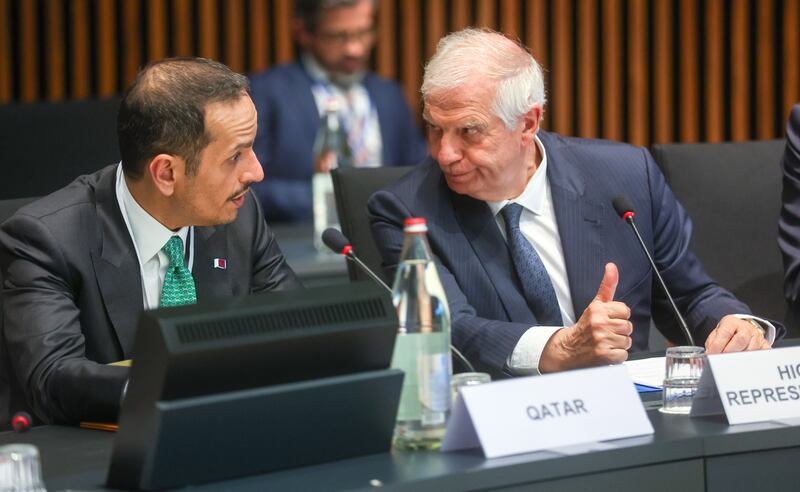Live updates: Follow the latest on Israel-Gaza
Qatar's Prime Minister Sheikh Mohammed bin Jassim Al Thani on Monday told European and Arab diplomats he had “not lost hope” for a ceasefire in Gaza and preventing escalation of the war, days after saying his country was reassessing its role as mediator in the war.
“Results unfortunately have not yet been forthcoming but we have not lost hope,” said Sheikh Mohammed, speaking at the first high-level EU-Gulf Co-operation Council security forum.
“We will maintain our efforts. The state of Qatar reaffirms its constant position: that only diplomatic measures can end this bloodshed.”
Senior Arab diplomats joined their EU counterparts in Luxembourg to discuss security co-operation hours after they agreed in a separate meeting to toughen sanctions on Iran after its unprecedented drone and missiles attack on Israel on April 13.
The assault was a response to an Israeli strike on Iran's consulate in Damascus which killed seven officials. It also led to an Israeli drone attack on Isfahan, central Iran, on Friday.
Opening speeches at the forum, which has been two years in the making, were as such dominated by the Gaza war and recent tit-for-tat attacks between Israel and Iran.
“Our meeting is therefore a very timely occasion to see how we can calm the situation down,” said the EU's foreign affairs minister Josep Borrell. “Let me stress that in times of turmoil and escalating tensions, peace and multilateralism are challenges in both our regions.”
The forum aims at strengthening EU-GCC co-operation on matters such as nuclear proliferation, maritime security, terrorism financing and human trafficking. It comes after the EU launched a strategic partnership with the GCC in 2022.
GCC Secretary General Jasem Al Budaiwi said there would be agreements on illicit drug trafficking, police co-operation and criminal justice. He said Gulf countries wanted to strengthen their coastguard capacities and benefit from maritime information exchange and joint exercises at sea.
But he also warned against military escalation between Iran and Israel, telling his counterparts “the situation has taken a new turn for the worst with negative repercussions on the security of the region as a whole”.
Sheikh Mohammed last week said peace talks were in a “delicate phase” as mediation efforts between Israel and Hamas seemed to have reached a deadlock.
Israel said 129 of the hostages captured in the October 7 attacks, in which about 1,200 people died, remain in the enclave. Its retaliatory war against Hamas in Gaza has killed more than 34,100 people, officials in Gaza said.
The Qatari leader at the time decried “an abuse” of his country's mediation efforts but did not identify those he criticised.
Opening statements on Monday were scheduled to be followed by two and half hours of closed-door discussions. The UAE was represented by Reem Al Hashimy, Minister of State for International Co-operation.
Achieving a ceasefire in Gaza and finding a credible and effective alternative for the postwar scenario were likely to be topics of discussion, said Emily Tasinato, a researcher and analyst focused on politics and security in the Gulf region.
“The EU-GCC high-level forum in Luxembourg could provide an important platform to address these issues,” she told The National.
There have also been divergences of views between Arab and European countries over the Gaza war despite an agreement on a two-state solution, a call rejected by Israel's government.
Arab leaders have accused the EU of double standards over its strong support for Ukraine not being matched by its backing of Palestinians in Gaza, despite the rising death toll.
The EU is deeply divided over the war in Gaza. Some countries such as Germany stress Israel's right to self-defence while others, including Spain, call for the recognition of a Palestinian state and a diplomatic response to alleged human rights breaches by the Israelis.
There was no EU consensus to condemn Israel's April 1 bombing on the Iranian consulate in Damascus, but European capitals unanimously criticised Iran's response two weeks later. Many described it as a game changer.
Gulf countries have called on both parties to exercise restraint. “Arab Gulf countries, especially Saudi Arabia and the UAE, 100 per cent do not want to pay the price of an open confrontation,” said Ms Tasinato.
Gulf countries want to keep diplomatic channels with Iran open after Saudi Arabia signed a detente with Tehran in China last year.
They have also pushed back against Israeli claims that Arab countries are now part of an air-defence coalition after Jordan's help in destroying Iranian drones heading for Israel this month.
“We know Iran is our neighbour, we know for us to live in peace and stability and for them to live in peace and stability we need to work on making sure we have this continued dialogue,” Mr Al Budaiwi told The National last month.
“But if I sit with you in a dialogue, we have to make sure we don’t interfere in each other’s business.”
For the EU, engagement with Iran has become a “contentious issue”, said Ms Tasinato.
“This is due first of all to Iran's strategic partnership with Russia and Iran’s military support to Russia's war in Ukraine. It’s also related to the regime’s crackdown against protesters, its imprisonment of European citizens and of course Iran's support for Hamas.”

Ministers have yet to decide how they want Monday's EU-GCC high-level security meeting to be formalised.
“One can assume they will be talking more regularly but details must still be worked out,” an EU official said.
No announcements are expected after the meeting, though the European External Action Service (EEAS), headed by Mr Borrell, is planning to open the continent's diplomatic academy to Gulf diplomats after the forum.
The programme, which is still in its pilot phase, offers junior European diplomats a four-month course in the Belgian city of Bruges, followed by a month's training at the EEAS headquarters in Brussels.






